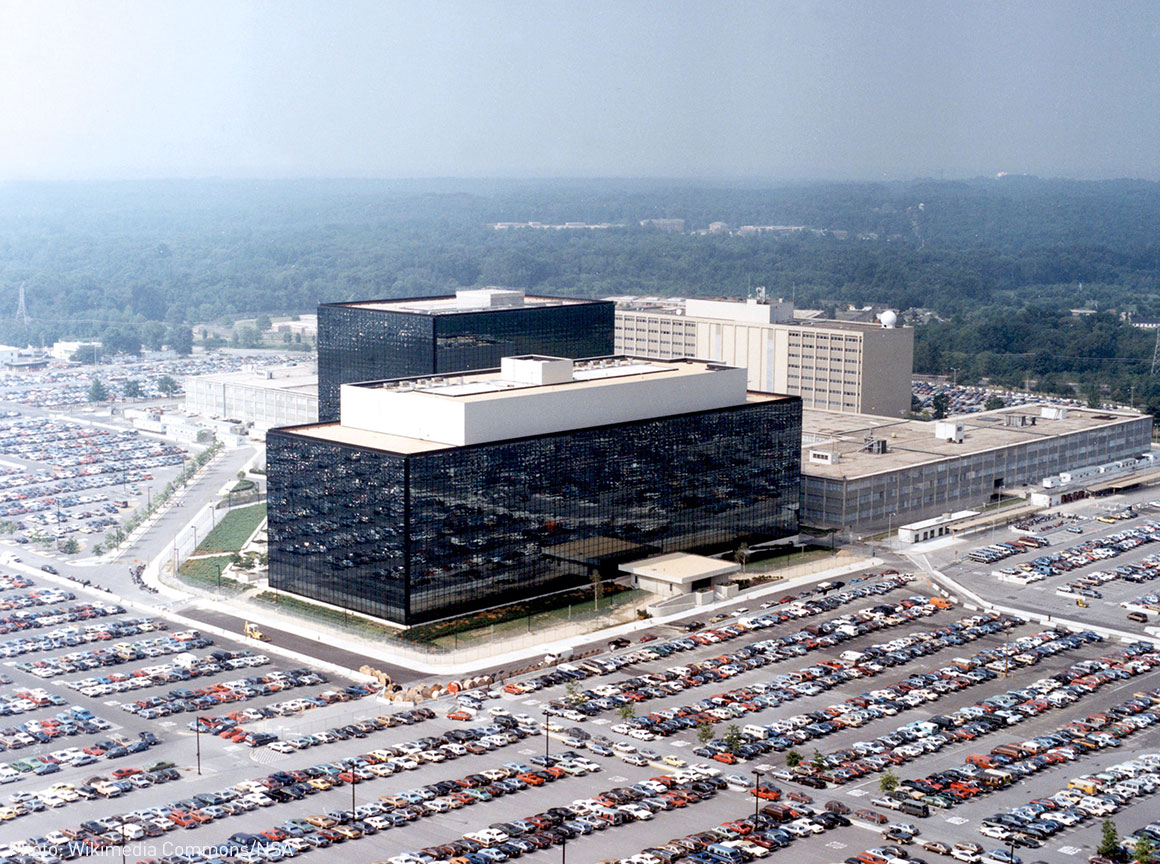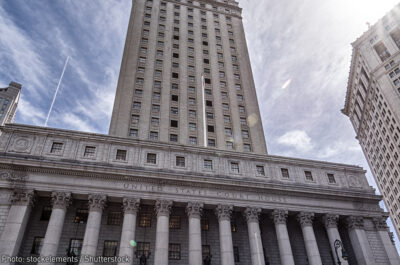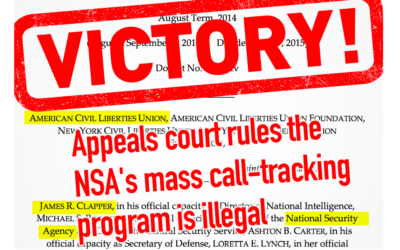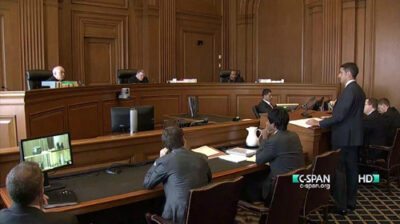
ACLU v. Clapper - Challenge to NSA Mass Call-Tracking Program
What's at Stake
On June 11, 2013, the ACLU filed a lawsuit challenging the legality of the National Security Agency’s mass collection of Americans’ phone records. The complaint argues that the dragnet violates the right to privacy protected by the Fourth Amendment as well as the freedoms of speech and association protected by the First Amendment. The complaint also charges that the program exceeds the authority that Congress provided in Section 215 of the Patriot Act. In May 2015, the Court of Appeals for the Second Circuit ruled that the call-records program violates Section 215 of the Patriot Act. Weeks later, on June 1, 2015, Section 215 briefly expired for the first time since the passage of the Patriot Act in 2001. The next day, Congress passed the USA Freedom Act, which amended Section 215 to prohibit the bulk collection of Americans’ call records.
Summary
On June 5, 2013, The Guardian revealed details of the NSA’s domestic spying activities, including a secret order from the Foreign Intelligence Surveillance Court (FISC) to Verizon Business Network Services. The order required the company to turn over on “an ongoing daily basis” phone call details including whom calls are placed to and from, when those calls are made, and how long they last. This information, known as metadata, can reveal intimate details about our private lives. On June 11, the ACLU and NYCLU, both of which are current or recent Verizon Business customers, filed the lawsuit to end the government’s call-tracking program and have all of the collected data deleted. In December 2013, a federal judge granted the government's motion to dismiss, and we successfully appealed.
On appeal, we argued that the call-records program is unconstitutional under the Fourth amendment because the NSA’s aggregation of metadata constitutes an invasion of privacy and an unreasonable search. We also argued that the call-tracking program violates the First Amendment, because it vacuums up sensitive information about associational and expressive activity.
Finally, we argued that the call-records program violates the statute that supposedly authorized it. Prior to passage of the Freedom Act, Section 215 of the Patriot Act – also known as the “business records” provision – allowed the FBI to obtain secret court orders from the FISC compelling third parties to produce “any tangible thing” that is “relevant” to foreign intelligence or terrorism investigations. We argued that the executive branch’s use of Section 215 goes far beyond what the statute permits. Whatever Section 215’s “relevance” requirement might have allowed, it did not permit the government to cast a seven-year dragnet sweeping up every phone call made or received by Americans. The court of appeals agreed.
Following the passage of the USA Freedom Act, the government petitioned the Foreign Intelligence Surveillance Court to allow the NSA to restart the program, arguing that the new law allows it to continue bulk collection during a 180-day transition period. The FISC granted the petition, but as the ACLU has argued in a new motion filed with the Second Circuit Court of Appeals, the Freedom Act does not permit bulk collection during the transition period, and even if it did, bulk collection is unconstitutional. The ACLU has asked the court of appeals to halt the continued collection.
The ACLU is also currently litigating a challenge to the NSA’s mass interception and searching of Americans’ international communications under the 2008 FISA Amendments Act and a Freedom of Information Act lawsuit seeking documents about the government’s use of Executive Order 12,333. We have also filed motions with the FISC asking it to release its secret opinions authorizing the NSA program.
Legal Documents
-
05/06/2016
Order endorsing Second Joint Status Report -
05/04/2016
Second Joint Status Report -
01/19/2016
Order endorsing First Joint Status Report -
01/07/2016
First Joint Status Report -
12/11/2015
Order requiring joint status report
Date Filed: 05/06/2016
Court: District Court (S.D.N.Y.) - After remand from appeals court
Download DocumentDate Filed: 05/04/2016
Court: District Court (S.D.N.Y.) - After remand from appeals court
Download DocumentDate Filed: 01/19/2016
Court: District Court (S.D.N.Y.) - After remand from appeals court
Download DocumentDate Filed: 01/07/2016
Court: District Court (S.D.N.Y.) - After remand from appeals court
Download DocumentDate Filed: 12/11/2015
Court: District Court (S.D.N.Y.) - After remand from appeals court
Download Document-
10/29/2015
Opinion (denying PI Motion and remanding) -
08/06/2015
ACLU PI Motion Reply Brief -
07/27/2015
Government Suppl. Brief and Opposition to PI Motion -
07/14/2015
ACLU Preliminary Injunction Motion (PI Motion) -
05/07/2015
Opinion (holding call-record program unlawful) -
04/24/2014
ACLU Reply Brief -
04/10/2014
Government Response Brief -
03/14/2014
Amicus Briefs in support of ACLU -
- Rutherford Institute
- Experts in Computer & Data Science
- Association of the Bar of the City of New York
- Former Members of the Church Committee & Law Professors
- PEN American Center
- Senators Ron Wyden, Mark Udall, & Martin Heinrich
- National Rifle Association
Experts in Computer & Data ScienceDate Filed: 03/14/2014
Court: Appeals Court (2d Cir.)
Download DocumentAssociation of the Bar of the City of New YorkDate Filed: 03/14/2014
Court: Appeals Court (2d Cir.)
Download DocumentFormer Members of the Church Committee & Law ProfessorsDate Filed: 03/14/2014
Court: Appeals Court (2d Cir.)
Download DocumentSenators Ron Wyden, Mark Udall, & Martin HeinrichDate Filed: 03/14/2014
Court: Appeals Court (2d Cir.)
Download Document -
03/07/2014
ACLU Opening Brief (Corrected) -
01/02/2014
Notice of Appeal
Date Filed: 10/29/2015
Court: Appeals Court (2d Cir.)
Download DocumentDate Filed: 07/27/2015
Court: Appeals Court (2d Cir.)
Download DocumentDate Filed: 07/14/2015
Court: Appeals Court (2d Cir.)
Download DocumentDate Filed: 05/07/2015
Court: Appeals Court (2d Cir.)
Download DocumentDate Filed: 03/07/2014
Court: Appeals Court (2d Cir.)
Download Document-
12/27/2013
Order Granting MTD and Denying ACLU PI Motion -
12/03/2013
Transcript of Oral Argument -
10/25/2013
ACLU PI Motion Reply Brief -
-
10/25/2013
Supplemental Declaration of Professor Edward W. Felten
Supplemental Declaration of Professor Edward W. FeltenDate Filed: 10/25/2013
Court: District Court (S.D.N.Y.)
Download Document -
10/25/2013
-
10/25/2013
Government MTD Reply Brief -
-
10/25/2013
Ex. 1 - FISC Opinion (Oct. 11, 2013) -
10/25/2013
Ex. 2 - FISC Supplemental Opinion (Dec. 12, 2008)
Ex. 1 - FISC Opinion (Oct. 11, 2013)Date Filed: 10/25/2013
Court: District Court (S.D.N.Y.)
Download DocumentEx. 2 - FISC Supplemental Opinion (Dec. 12, 2008)Date Filed: 10/25/2013
Court: District Court (S.D.N.Y.)
Download Document -
10/25/2013
-
10/15/2013
Order Lifting Stay (Imposed Due to Government Shutdown) -
10/11/2013
Government Opposition to Motion to Lift Stay -
10/11/2013
ACLU Motion to Lift Stay (Imposed Due to Government Shutdown) -
10/01/2013
Government Opposition to PI Motion -
-
10/01/2013
Holley Declaration -
10/01/2013
Shea Declaration -
10/01/2013
FISC Opinion as exhibit
-
10/01/2013
-
10/01/2013
ACLU Opposition to MTD -
09/04/2014
Amicus Briefs in support of ACLU -
- Congressman F. James Sensenbrenner, Jr.
- Reporters Committee for Freedom of the Press & 18 News Media Organizations
- Michael P. Lynch, Professor of Philosophy at the University of Connecticut
- National Rifle Association
- PEN American Center
- Former Members of the Church Committee and Law Professors
Congressman F. James Sensenbrenner, Jr.Date Filed: 09/04/2013
Court: District Court (S.D.N.Y.)
Download DocumentReporters Committee for Freedom of the Press & 18 News Media OrganizationsDate Filed: 09/04/2013
Court: District Court (S.D.N.Y.)
Download DocumentMichael P. Lynch, Professor of Philosophy at the University of ConnecticutDate Filed: 09/04/2013
Court: District Court (S.D.N.Y.)
Download DocumentNational Rifle AssociationDate Filed: 09/04/2013
Court: District Court (S.D.N.Y.)
Download DocumentFormer Members of the Church Committee and Law ProfessorsDate Filed: 08/30/2013
Court: District Court (S.D.N.Y.)
Download Document -
08/26/2013
ACLU Preliminary Injunction Motion (PI Motion) (with declarations) -
08/26/2013
Government Motion to Dismiss (MTD) -
07/18/2013
Government Pre-Motion Letter to Court -
07/03/2013
ACLU Pre-Motion Letter to Court -
06/11/2013
Complaint
Date Filed: 12/27/2013
Court: District Court (S.D.N.Y.)
Download DocumentDate Filed: 12/03/2013
Court: District Court (S.D.N.Y.)
Download DocumentDate Filed: 10/25/2013
Court: District Court (S.D.N.Y.)
Download DocumentDate Filed: 10/25/2013
Court: District Court (S.D.N.Y.)
Download DocumentDate Filed: 10/15/2013
Court: District Court (S.D.N.Y.)
Download DocumentDate Filed: 10/11/2013
Court: District Court (S.D.N.Y.)
Download DocumentDate Filed: 10/11/2013
Court: District Court (S.D.N.Y.)
Download DocumentDate Filed: 10/01/2013
Court: District Court (S.D.N.Y.)
Download DocumentDate Filed: 08/26/2013
Court: District Court (S.D.N.Y.)
Download DocumentDate Filed: 08/26/2013
Court: District Court (S.D.N.Y.)
Download DocumentDate Filed: 07/18/2013
Court: District Court (S.D.N.Y.)
Download DocumentDate Filed: 07/03/2013
Court: District Court (S.D.N.Y.)
Download DocumentPress Releases
ACLU Comment on NSA Request to Keep Phone-Records Program Alive
ACLU Asks Appeals Court to Halt NSA’s Resumption of Bulk Phone Records Collection
Appeals Court Strikes Down NSA Phone Spying Program in ACLU Lawsuit
ACLU Appeals Dismissal of Lawsuit Challenging NSA Call-Tracking Program
Judge Grants Motion to Dismiss in NSA Surveillance Case
Oral Argument Friday in ACLU Challenge to NSA Phone Spying Program




